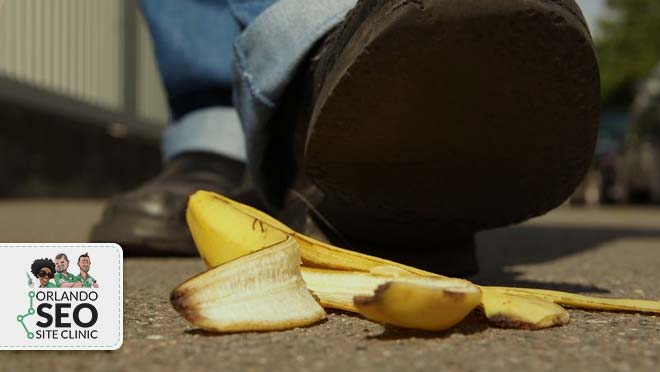Share this Post
Today it seems that everyone and their cousin is a website consultant, but still business is limping forward because their websites are riddled with dozens of mistakes that hurt their search engine rankings. The good news is that some mistakes are easy to make and quick to fix while others require rolling up your sleeves and getting into the dirty work of site programming. Today we’ll focus on the five most common SEO mistakes people make and how you can fix them in a hurry.
Top 5 Most Common SEO Mistakes
Mistake #1: Targeting the wrong keywords
As SEO has become ever more mainstream “Keywords” have become a kind of a buzzword in their own right, but few people have a clear strategy for how to pick the keywords that make a difference. Tossing in random keywords moments before your site goes live is futile. Conducting proper keyword research can truly make or break your SEO campaign because a successful site must have both excellent content and effective keywords to attract traffic.How to fix it:
Allow enough time to thoughtfully brainstorm how your target audience is likely to search for your business/ solution online. Use keyword search tools to identify high traffic medium competition search terms that are relevant to your business. These terms are popularly searched for on the web but have a low enough amount of competition that allows for your website to have a fighting chance of standing out in the pack. Keywords should also be appropriate to your industry and directly related to the content on the page. It’s best to optimize for more than one keyword and use long-tailed keyword phrases to target niche topics (for example: “PPC Campaign” is considered a keyword and “How to start a PPC campaign” is a long-tail keyword phrase). Some keyword search tools include the Google Adwords Keyword tool, Wordze, Keyword Discover, and Wordtracker, to name just a few.Mistake #2: Doubling up & Duplicates
Because search engines are looking to create a natural internet filing system, sites with duplicate content and multiple URLs for the same webpage create a filing nightmare. Publishing similar or duplicate content (whether it’s the same website or across two different sites) confuses the search engines because they can’t figure out which content to index. Publishing duplicate URLs is equally damaging and causes the page to be devalued in the rankings.How to fix it:
Do a careful read through of your website as well as your competitors’ web pages to minimize publishing similar or duplicate content. Force yourself to write with an original perspective and to include information that others in your industry may be overlooking. Delete duplicate pages from your website or set up a 301 redirect which will funnel visitors to the original webpage. If you’re not sure what that means, contact a web programmer to set it up for you.Mistake #3: Falling for SEO black magic
Far too often business owners and unexperienced SEO consultants try to cut corners and beat the system by using “black hat techniques” on their websites. These techniques sidestep the rules and disregard search engine guidelines. While they may win some successes in the short term, the long-term consequences can be devastating – resulting in blacklisted sites that fall off the ranking lists entirely. These techniques include things like keyword stuffing (cramming keywords into a text as many times as possible), using hidden text (camouflaging stuffed keywords by making them the same color as the background), and buying links from other websites or writers.How to fix it:
Before signing up with an SEO agency or consultant, be sure to ask the critical questions that will give you a sense of both their knowledge and integrity. After all, many of them are happy to “fix up your site,” collect the bill, and leave you to deal with the repercussions. Ask what common optimizations they make, what they recommend for your specific website if they offer a guarantee, and whether or not they can provide references.If you’re trying to clean up the “black hat techniques” and botched SEO on your website, working with a true professional is the best way to get your site back on track.
Mistake #4: Not having a mobile website design
Having a responsive website that adjusts to tablet and smartphone screens is now more important than ever before. In fact, Google and other search engines favor responsive websites because of the improved usability experience. SEO is all about serving up the highest quality, most relevant, highest value websites. That includes that usability plays a role and websites that cater to the ever-growing mass of mobile users has a distinct advantage over those that are stuck in the PC dinosaur age.
Not sure if your site is mobile or not? Visit this website, type in your URL and experience how your website appears on a variety of different devices.
How to fix it:
If you’re building your site yourself, be sure to choose a template that is “mobile friendly” or has a “responsive design.” These templates should adjust to proper sizing and single scroll for all mobile devices. If your site is a custom design or has more complex functionality, contact a web designer to make the necessary adjustments.
Mistake #5: Leaving SEO to the bitter end
“Ok, my website’s published! Now., what was that SEO thing I was supposed to do?” Leaving SEO as an afterthought means you’re not only missing out on essential marketing tools but that now you have to go back and do double the work. Think of it like baking a cake and trying to go back and add the baking powder just before the timer goes off…it’s going to be a messy business. SEO is not frosting; it’s an essential ingredient that should be considered from the very beginning.
How to fix it:
Avoid investing in SEO “after the fact.” Not only will you want to conduct keyword research, create optimized content, and write title tags, meta description tags, and proper headers – you’ll also need to consider things like creating a crawlable site architecture, URL structure, configuring CMS, and more.
In an ideal world, all of these obstacles would be accounted for while your website is still in its infancy, but most SEO optimizations take business owners by surprise and have them shuffling to spiff up their web pages before they slip much further down the rankings.
If you’re interested in receiving a comprehensive website audit to find and fix your SEO mistakes, you can take a look under the hood yourself or work with a professional.
Share this Post

